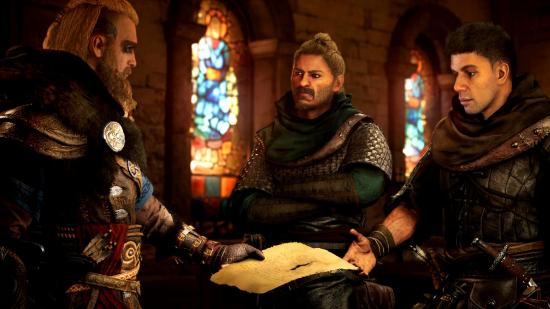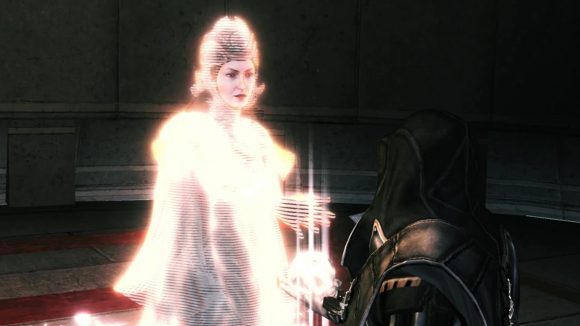Ubisoft’s attention to detail when it comes to Assassin’s Creed Valhalla, and the deep lore that permeates this game and the entire franchise, is truly remarkable. It’s the result of thousands of hours of work from hundreds of developers – and we can only imagine how hard it is to tie everything together narratively, too. However, what if we told you that one of the most sophisticated details in this fantastical universe was created by just one man? You’d be shocked, right? Well… Ubisoft has decided to tell the story of Antoine Henry, the man behind Assassin’s Creed Valhalla’s Isu language, during its 15th anniversary celebrations – and it’s an incredible story.
Henry first found himself falling into the lure of linguistics and the idea of creating languages from scratch all the way back in 2011, while he was working as a game designer for Ubisoft Paris. However, this wasn’t when his work on this language began. Henry, in his own words, “started working on Assassin’s Creed Valhalla in 2018, mostly on gameplay elements related to ships” thanks to his four years of work on Skull and Bones prior to this.
So… Just, hang on a minute. How does a gameplay designer working on Viking longships fall into the challenge of throwing together an entire language for a race of ancient beings vital to the lore of a major video game franchise? Well, that’s where the narrative director on Assassin’s Creed Valhalla, Darby McDevitt, comes into the story.
Discovering Henry’s passion for languages and linguistics in 2018, McDevitt shared his long-time ambition of creating a language for the Assassin’s Creed franchise with the game designer and the rest was history – more or less, anyway.
“ I especially remember the day that the Star Trek team released a Klingon dictionary”, says McDevitt. “That really reignited my interest in creating languages… creating a language for Assassin’s Creed was an old idea that we had sometime around the creation of Assassin’s Creed Origins… But, we didn’t have the time or resources to do it back then.”
Thankfully, as we now know, it looks like the development team did have enough time and resources to develop it. Although, it wasn’t as smooth sailing as just starting work on the project the next day. The Isu language has been popping up in Assassin’s Creed games since the second one – when Minerva offers Ezio a foreboding message about impending doom at the end of the game. However, what made up this mysterious language for so long was never actually quantified and made understandable, as Henry explains.
“ At the time, artists created a series of glyphs and symbols that weren’t supposed to mean anything… Their purpose was mostly to represent the civilization in an aesthetic way. Placed on textures throughout the games, they made it seem like writings related to the Isu people actually existed.”
However, the writings that Henry is talking about didn’t actually exist back when Assassin’s Creed II was being developed – in fact, the Isu name itself wasn’t established until Assassin’s Creed Unity. The Isu language continued to be scattered throughout the series, but without any official quantification or any joint effort to establish a common set of symbols to make it understandable, it was represented in a number of different ways – depending on when and where the Assassin’s Creed game was set.
Despite the shared enthusiasm of Henry and McDewitt, nothing came of their conversation on the Isu language – at first. However, a couple of weeks after Henry found himself leaving Ubisoft, he got the call – and it’s safe to say that he was thrilled.
But, now Henry was met with the challenge of throwing together an intelligible language based on a smattering of seemingly random symbols from a handful of games – which was no small feat. Interestingly, the key that unlocked the Isu language as we know it today was the Voynich Manuscript – a mysterious real-life 15th century book that featured in Assassin’s Creed IV Black Flag as a translatable Isu text.
“ It was perfect for me”, Henry explains, “because I had encrypted symbols in the lore that could be deciphered with a tool. had everything I needed to create the illusion I was trying to set up. But of course, an alphabet is not enough to create a language… After all, you can write French words using Japanese characters. So I needed to define a grammatical system, a structure, and this language had to have something to say to the players.”
Using the idea that the Isu created humanity – which is where they sit in the lore of Assassin’s Creed – Henry looked at the largest language family in the world for inspiration and began applying a “de-evolutionary pattern” to these languages to create a new one.
Of course, this took a lot of time and the challenge of implementing this into the game – and the promotional materials for Assassin’s Creed Valhalla and its expansions – was another challenge altogether. However, by creating a real language system with syntax and grammar, it gave the development team much more freedom in how they implemented this language to deepen the lore and experience Assassin’s Creed Valhalla offers its players.
Now, thanks to the work of Antoine Henry (who has been immortalised in-game with an NPC called Antony Henry), players can quite-literally learn a new language through playing and exploring the hidden texts in-game. If you want to read into this in a little more detail and explore how Ubisoft went about creating a collective investigation of sorts for the Assassin’s Creed fanbase, you can find the article on the creation of the Isu language right here.
We know England in Assassin’s Creed Valhalla is more accurate than you think, but did you know that reports claim Assassin’s Creed Infinity could finally visit Japan? We have already said why an Aztec Assassin’s Creed game makes perfect sense, but that would work too.


